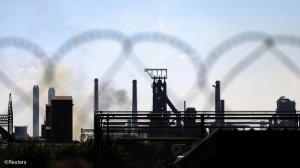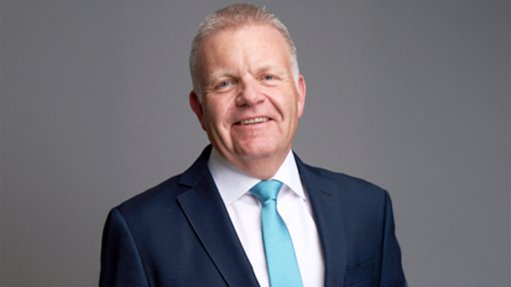AMSA’s decarbonisation plans on hold while long steel crisis persists

In this video AMSA CEO Kobus Verster discusses the company's delayed decarbonisation projects and the impact of the international and domestic markets on AMSA's performance.
Steelmaker ArcelorMittal South Africa (AMSA) is effectively putting its ambitious decarbonisation plans on hiatus while it figures out how to navigate the crisis surrounding the impending closure of its beleaguered long steel plants.
During the company’s interim results presentation for the six months ended June 30, CEO Kobus Verster told Engineering News that, while the company’s decarbonisation plans were highly attractive from a cost-benefit perspective, it could not move ahead while the company faced so many uncertainties in its core business model.
“To be honest, we need to resolve the longs issue and the Newcastle issue first. It’s very difficult to track investment of that scale, either directly or indirectly, without having a good core business that's performing,” he said on July 31.
In May last year, Engineering News reported that AMSA planned to break ground on a 200 MW solar PV power plant at its Vanderbijlpark facility, in Gauteng, before the end of 2024.
However, this has not transpired. Aside from the hesitation brought about by the company’s ailing financial position, Verster also blamed State-owned utility Eskom for the delay. However, he indicated that AMSA was still eager to pursue the project in future.
“We have gone to market and we've got quotes, so we've got the whole project almost wrapped up. We need to finish a few connection agreements with Eskom. So those things are not progressing at the speed that we would like. Hopefully we can solve that in the near term and then we can start activating that project,” he said.
AMSA first announced that it would be closing its two loss-making long steel plants in Newcastle, KwaZulu-Natal, and Vereeniging, Gauteng, in 2023. However, following several years of failed attempts to find solutions through discussions with government, Verster said the company would be moving ahead with the closure plans, with about 3 500 jobs to be cut.
RESULTS
AMSA reported continued operational and financial strain in the six months to June 30, citing an adverse international and domestic steel market, compounded by persistent structural challenges in South Africa’s operating environment.
Verster stated that although crude steel production increased by 5% to 1.28-million tonnes, this was offset by an 11% decline in sales volumes, which fell to 1.05-million tonnes. Local sales decreased by 10% to 836 000 t, while export sales volumes declined by 13% to 210 000 t. Steel inventories rose by 36% to 402 000 t, reflecting weak market absorption.
Realised steel prices declined by 7% in rand terms and by 5% in dollar terms, driven by a combination of a stronger rand exchange rate and continued international pricing pressure. In rand terms, the raw material basket (RMB), which constituted 42% of AMSA’s cash cost per tonne, fell by 12%, primarily owing to lower coal and coke costs.
Meanwhile, consumables and auxiliaries accounted for 39% of per-tonne costs, a slight increase from 35% in the prior comparable period. Fixed costs, which made up 19% of per-tonne costs, were reduced by R166-million, or 5%, to R3.251-billion, owing to tighter cost management.
Despite ongoing cost control measures and the company’s R420-million value plan contribution, compared with R434-million in the prior interim period, AMSA recorded a loss before interest, taxes, depreciation and amortisation of R394-million, which included R1.08-billion in funding support from the Industrial Development Corporation (IDC) to offset losses in the longs business.
The headline loss for the period amounted to R1.01-billion, a marginal improvement on the R1.11-billion loss recorded in the first half of 2024. Net borrowings were reported at R4.62-billion, down from R5.111-billion in the second half of 2024, with the reduction reflecting capitalisation of interest and deferred income totalling R842-million from the IDC funding.
The IDC funding was used to delay the wind-down of the longs business and was described by Verster as having been applied in a “responsible, transparent and well-considered manner” in support of sustaining productive capacity, preserving supply chain vitality, and protecting jobs.
Verster confirmed that the company was still awaiting the outcome of the IDC’s due diligence process. In the absence of a sustainable resolution, the final wind-down of the longs business remained targeted for completion by September 30.
Verster described the international steel environment as “prolonged and severely negative”, with international hot rolled coil and rebar prices down by 10% and 11% respectively in dollar terms compared with the prior year, and by 22% and 21% respectively compared with the first half of 2023.
He noted that global steel production fell by 2% to 934-million tonnes. China’s production declined by 2% to 515-million tonnes, though it retained a 55% global share. Exports from China rose by 9.2% to 58-million tonnes in the first half of this year, reaching a nine-year high of 111-million tonnes on an annualised basis.
International steel spreads averaged $130/t, significantly below the sustainable range of $200/t to $220/t. The RMB declined by 21% in dollar terms, with coking coal down 33%, iron-ore down 14%, and scrap metal down 12%. These declines offered some cost relief, but were insufficient to offset falling prices and low demand.
On the domestic front, South Africa’s steel market remained constrained.
The country’s GDP growth was expected to reach only 0.9% this year, with apparent steel consumption falling by 6% to 2.1-million tonnes.
Verster highlighted ongoing weak demand in key sectors such as construction, mining, and manufacturing, which posted growth rates of 0.5%, -2.3%, and -1.9%, respectively.
Steel imports accounted for 37% of total apparent steel consumption, with 90 000 t of billets imported, mostly from Zimbabwe, duty-free, while 240 000 t of billets were exported as scrap in the same period. AMSA stated that an estimated 518 000 t of imported steel could have been manufactured locally.
Domestically, the company continued to face structural constraints, including excessive rail and port tariffs, energy costs above international benchmarks, and significant logistical disruptions.
Cable theft, locomotive failures and inconsistent rail services added R317-million in direct and indirect costs in the first half, up from R127-million in the prior year. Electricity disruptions led to a loss of R41-million, up from R25-million in the comparable period.
AMSA’s flats business saw a notable improvement in reliability and capacity utilisation, which rose to 69% from 58%, following targeted maintenance and investment. Projects included R93-million for restoration of Blast Furnace C, R95-million for repairs to Blast Furnace D, and R505-million towards the Plate Mill refurbishment.
The company continued to focus on cost reduction, quality improvement and increased import replacement.
In contrast, the longs business continued to operate at low capacity utilisation levels, reported at 52%. Production was hampered by a weak order book, unreliable rail logistics, high electricity tariffs, which had increased by 887%, and insufficient protection from low-priced imports.
Verster said AMSA was prioritising cost reduction in this segment, particularly with regard to the RMB and energy efficiency. He warned that unless a sustainable solution was reached soon, the company would be compelled to shut down its blast furnace in early August to prevent further financial deterioration. Should this occur, operations would be placed in care-and-maintenance mode, enabling a potential restart if conditions improved.
Verster reiterated the company’s call for urgent government action, including support measures for the steel industry in line with those implemented by other countries. He said the industry required infrastructure-led demand stimulation, tighter controls on imports and illicit trade, and decisive action on the Preferential Pricing System and scrap export taxes.
He also called on the authorities to expedite policy development in support of decarbonisation and to finalise the long-awaited International Trade Administration Commission of South Africa steel tariff review.
Article Enquiry
Email Article
Save Article
Feedback
To advertise email advertising@creamermedia.co.za or click here
Press Office
Announcements
What's On
Subscribe to improve your user experience...
Option 1 (equivalent of R125 a month):
Receive a weekly copy of Creamer Media's Engineering News & Mining Weekly magazine
(print copy for those in South Africa and e-magazine for those outside of South Africa)
Receive daily email newsletters
Access to full search results
Access archive of magazine back copies
Access to Projects in Progress
Access to ONE Research Report of your choice in PDF format
Option 2 (equivalent of R375 a month):
All benefits from Option 1
PLUS
Access to Creamer Media's Research Channel Africa for ALL Research Reports, in PDF format, on various industrial and mining sectors
including Electricity; Water; Energy Transition; Hydrogen; Roads, Rail and Ports; Coal; Gold; Platinum; Battery Metals; etc.
Already a subscriber?
Forgotten your password?
Receive weekly copy of Creamer Media's Engineering News & Mining Weekly magazine (print copy for those in South Africa and e-magazine for those outside of South Africa)
➕
Recieve daily email newsletters
➕
Access to full search results
➕
Access archive of magazine back copies
➕
Access to Projects in Progress
➕
Access to ONE Research Report of your choice in PDF format
RESEARCH CHANNEL AFRICA
R4500 (equivalent of R375 a month)
SUBSCRIBEAll benefits from Option 1
➕
Access to Creamer Media's Research Channel Africa for ALL Research Reports on various industrial and mining sectors, in PDF format, including on:
Electricity
➕
Water
➕
Energy Transition
➕
Hydrogen
➕
Roads, Rail and Ports
➕
Coal
➕
Gold
➕
Platinum
➕
Battery Metals
➕
etc.
Receive all benefits from Option 1 or Option 2 delivered to numerous people at your company
➕
Multiple User names and Passwords for simultaneous log-ins
➕
Intranet integration access to all in your organisation

















